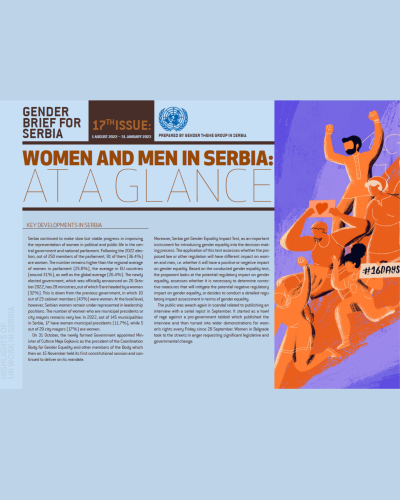17th Issue of Gender Brief for Serbia

Serbia continued to make slow but stable progress in improving the representation of women in political and public life in the central government and national parliament. Following the 2022 election, out of 250 members of the parliament, 91 of them (36.4%) are women. The number remains higher than the regional average of women in parliament (25.8%), the average in EU countries (around 31%), as well as the global average (26.4%). The newly elected government, which was officially announced on 26 October 2022, has 28 ministries, out of which 9 are headed by a woman (32%). This is down from the previous government, in which 10 out of 23 cabinet members (43%) were women. At the local level, however, Serbian women remain under-represented in leadership positions. The number of women who are municipal presidents or city mayors remains very low. In 2022, out of 145 municipalities in Serbia, 17 have women municipal presidents (11.7%), while 5 out of 29 city mayors (17%) are women. On 31 October, the newly formed Government appointed Minister of Culture Maja Gojkovic as the president of the Coordination Body for Gender Equality and other members of the Body which then on 15 November held its first constitutional session and continued to deliver on its mandate.
Moreover, Serbia got Gender Equality Impact Test, as an important instrument for introducing gender equality into the decision-making process. The application of this test assesses whether the proposed law or other regulation will have different impact on women and men, i.e. whether it will have a positive or negative impact on gender equality. Based on the conducted gender equality test, the proponent looks at the potential regulatory impact on gender equality, assesses whether it is necessary to determine corrective measures that will mitigate the potential negative regulatory impact on gender equality, or decides to conduct a detailed regulatory impact assessment in terms of gender equality. The public was awash again in scandal related to publishing an interview with a serial rapist in September. It started as a howl of rage against a pro-government tabloid which published the interview and then turned into wider demonstrations for women’s rights every Friday since 28 September. Women in Belgrade took to the streets in anger requesting significant legislative and governmental change.

